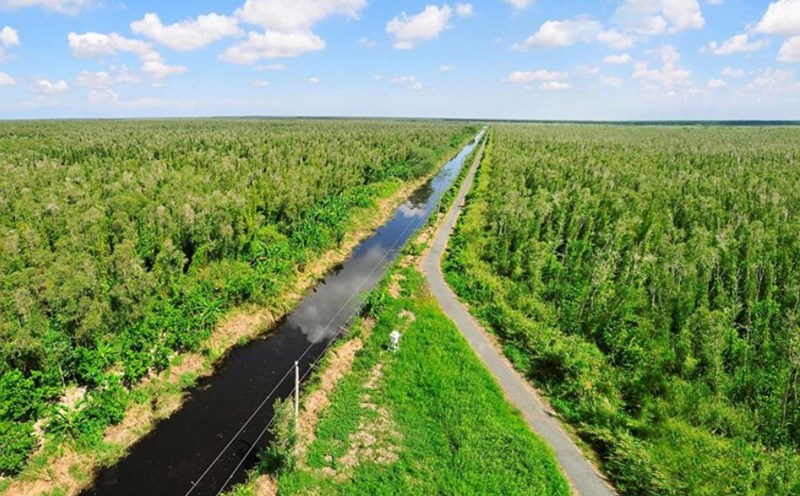On December 30, Lao Dong Newspaper organized a discussion with the theme "Opportunities and challenges of the carbon credit market in Vietnam" to seek solutions to orient the development of the carbon credit market, while improving Vietnam's competitiveness in this field compared to other countries.
The seminar was attended by many leading experts such as Associate Professor Dr. Nguyen Dinh Tho - Director of the Institute of Strategy and Policy on Natural Resources and Environment (Ministry of Natural Resources and Environment), and Associate Professor Dr. Dinh Trong Thinh - Former Head of the Faculty of International Finance, Academy of Finance. The opinions shared at the event clarified both the opportunities and challenges in developing the carbon credit market in Vietnam.
In an effort to join hands with the international community to combat climate change in the spirit of the Kyoto Protocol, Vietnam signed a written agreement with the World Bank on October 22, 2020. Accordingly, in the 2018-2024 period, Vietnam will transfer 10.3 million tons of CO2 to reduce emissions in the North Central region with a total value of 51.5 million USD (about 1,200 billion VND). At the same time, the two sides also agreed on an emission reduction program in the Central Highlands and South Central regions in the 2022-2026 period, with an expected forest area of about 4.26 million hectares.
Associate Professor Dr. Nguyen Dinh Tho - Director of the Institute of Strategy and Policy on Natural Resources and Environment said that the carbon credit market is divided into two main types: Compliance market and voluntary market. While the compliance market is the foundation for countries to develop the carbon credit market, in Vietnam, the voluntary market is still limited. Although it does not have great potential like Brazil or the countries in the Amazon region, Vietnam still has the opportunity to develop the carbon credit market in the fields of agriculture and forestry.
However, Associate Professor Dr. Nguyen Dinh Tho emphasized that the development of this market depends largely on State policies and the ability to connect the two markets. Accordingly, the implementation of the project to develop one million hectares of low-emission rice will contribute to creating carbon credits, contributing to the transition of Vietnam to a low-emission economy.
Associate Professor, Dr. Dinh Trong Thinh affirmed that if Vietnam makes good use of its existing potential, it can reap significant benefits from carbon credit activities. It is important to widely disseminate information so that people understand and implement energy-saving measures and reduce emissions in their daily lives and production. This is not only a solution to improve economic efficiency in the short term, but also contributes to sustainable development and building a green economy for the future.
However, according to Associate Professor Dr. Nguyen Dinh Tho, to effectively implement this, it is necessary to carry out inventory, reporting and confirmation of carbon credits, which requires large investments in technology and costs. The application of digital transformation, cloud technology or blockchain is considered the key to effectively managing and exploiting carbon credits. He also noted that focusing only on carbon credits from forestry will encounter many difficulties. Therefore, connecting the compulsory and voluntary credit markets, along with multilateral cooperation under Article 6 of the Paris Agreement, will help increase the value of Vietnam's carbon credits in the international market.
Associate Professor Dr. Dinh Trong Thinh - Former Head of the International Finance Department, Academy of Finance, said that in order for Vietnam to compete effectively in the international carbon credit market, it is necessary to focus on organizing appraisal, measurement and quality assurance activities in the production, business and supply of carbon credits. He emphasized that programs need to be built with a long-term sustainable development orientation.
According to Associate Professor Dr. Dinh Trong Thinh, the development of CO2 absorption activities such as agriculture, forestry, renewable energy (wind power, solar power), coastal afforestation and environmental treatment need to be included in the master plan. These are core issues that management agencies need to address. Localities need to comply with the master plan, promote sustainable development, save resources, reduce the use of non-renewable materials, and optimize CO2 absorption capacity.
"Only by improving sustainable competitiveness from each locality to the whole country can Vietnam affirm its position in the global carbon credit market," said Mr. Thinh.











